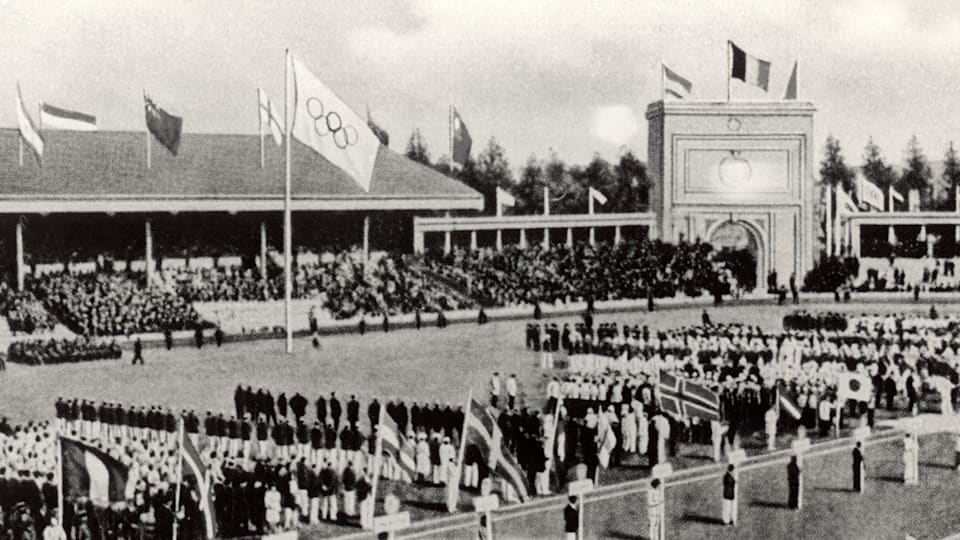
Welcome to This Week in Olympic Sports History, where Olympics.com remembers significant sports events from the past. This week, we will cover April 22-28.
On this day - 23 April 1920: Ice hockey's Olympic debut...at the Games 1920
Ice hockey, often associated with the winter chill, made an unexpected debut at the Olympic Games in Antwerp on 23 April 1920. While it would later find a permanent home at the Winter Olympic Games, its inaugural appearance set the stage for the sport's popularisation.
In the first-ever hockey tournament, seven players per side competed using the Bergvall System, which consisted of three rounds. Teams played in an elimination tournament for the gold medal. The silver and bronze medal rounds included teams defeated by the gold medal winner.
Canada wins first-ever Ice Hockey Olympic Gold
Canada dominated the competition, clinching the first of its nine gold medals in the men's competition. Represented by the Winnipeg Falcons, winners of the national amateur championship, the Canadians swept all games to become the inaugural Olympic Champion in Ice Hockey.
Team Canada won their matches with ease, including a 15-0 victory over Czechoslovakia, a hard-fought 2-0 win against the United States, and a 12-1 triumph over Sweden in the gold-medal match. The USA took silver, while Czechoslovakia came in third and claimed the bronze medal.
This landmark event laid the foundation for ice hockey's inclusion in future Olympic Games. IOC founder Pierre de Coubertin's advocacy for diverse sports at the Olympics paved the way for the discipline to debut in Antwerp. The tournament's success sparked widespread interest, leading to its permanent inclusion in the Winter Olympic Games from 1924 onwards.
Notable Olympic birthdays: April 22-28
- Yury Sharov (Russia, Fencing, Olympic champion), born 22 April 1939
- Spencer Haywood (USA, Basketball, Olympic champion), born 22 April 1949
- Kacey Bellamy (USA, Hockey, Olympic champion), born 22 April 1987
- English Gardner (USA, Athletics, Olympic champion), born 22 April 1992
- Donna Weinbrecht (USA, Freestyle Skiing, Olympic champion), born 23 April 1965
- Gezahegne Abera (Ethiopia, Athletics, Olympic champion), born 23 April 1978
- Jennifer Heil (Canada, Freestyle Skiing, Olympic champion), born 23 April 1983
- Alistair Brownlee (UK, Athletics, Olympic champion), born 23 April 1988
- Chloe Kim (USA, Snowboard, two-time Olympic champion), born 23 April 2000
- Martín López-Zubero (Spain, Swimming, Olympic champion), born 23 April 1969
- Joseph Barthel (Luxemburg, Athletics, Olympic champion), born 24 April 1927
- Eddie James Hart (USA, boxing, Olympic champion), born 24 April 1948
- Yvette Williams (New Zealand, Athletics, Olympic champion), born 25 April 1929
- Lia Manoliu (Romania, Athletics, Olympic champion), born 25 April 1932
- Angel Martino (USA, Swimming, three-time Olympic champion), born 25 April 1967
- Tim Duncan (USA, Basketball, Bronze medallist), born 25 April 1976
- Elizabeth Chase (Zimbabwe, Hockey, Olympic champion), born 25 April 1950
- Edward Eagan (USA, Boxing, two-time Olympic champion), born 26 April 1897
- Francina Blankers-Koen (Netherlands, Athletics, four-tlme Olympic champion), born 26 April 1918
- Robert Boozer (USA, Basketball, Olympic champion), born 26 April 1937
- Donna De Varona (USA, Swimming, three-time Olympic champion), born 26 April 1947
- Charles Adkins (USA, Boxing, Olympic champion), born 27 April 1932
- Bridgette Gordon (USA, Basketball, Olympic champion), born 27 April 1967
- Bradley Wiggins (UK, Road and Track Cycling, Olympic champion), born 28 April 1980
- Tony Yoka (France, Boxing, Olympic champion), born 28 April 1992
- Diego Simeone (Argentina, Football, Olympic Silver medallist), born 28 April 1970
Quote of the week - Donna De Varona
Women in sports smash gender stereotypes, provide inspiring role models for all girls and portray gender equality.
Donna De Varona, born on 26 April 1947, has long been a champion of women's rights in sports. Since her retirement, the former swimming champion has promoted women's sports and amateur sports in general. Her activities have included membership in the Women's Sports Hall of Fame, the President's Commission on Olympic Sports, and the Women's Sports Foundation, which she founded and served as president.
NEW YORK, NY - OCTOBER 16: Former Olympic swimmer Donna de Varona onstage during the 34th annual Salute to Women In Sports Awards at Cipriani, Wall Street on October 16, 2013 in New York City. (Photo by Michael Loccisano/Getty Images for the Women's Sports Foundation)
Donna De Varona: From Gold Medallist to Trailblazer
In 1960, at only 13, De Varona became the youngest member of the U.S. swimming team and won a gold medal in the 4x100-metre freestyle relay at the Rome Olympics. However, by the time the 1964 Olympic Games in Tokyo rolled around, she had become the most renowned female swimmer in the world, having set 18 world records in just four years. She solidified her superstar status in Japan by winning two gold medals in the 400-metre individual medley and the 4x100-metre freestyle relay.
After her retirement, she became a TV commentator and was the first woman to hold such a position on network TV. She was also the first female sportscaster to cover the Olympic Games for television. Throughout her career, she was a vocal advocate and defender of women's rights and a strong supporter of Title IX legislation, which ensured that no one was denied participation in educational programs based on gender. She worked as a consultant to the Senate and was instrumental in developing the U.S. Amateur Sports Act.
Don't forget to check out Olympics.com next week for more sports and Olympic history.
